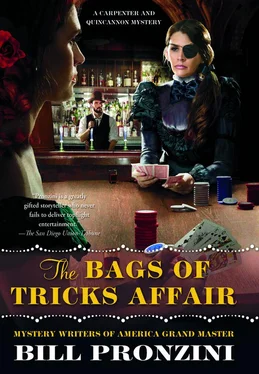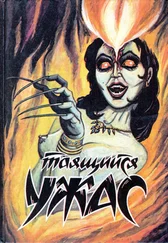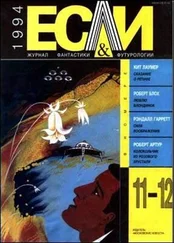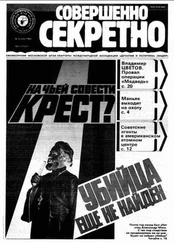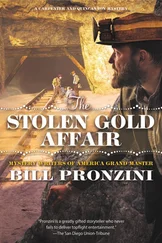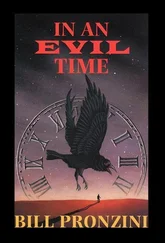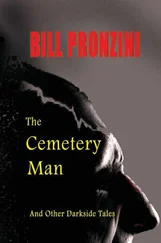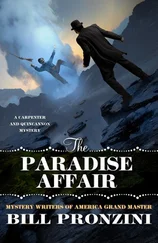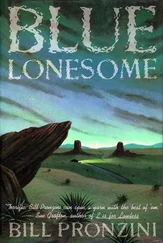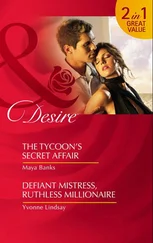He made a similar statement to James Parnell at the mayor’s mercantile store, after which the three of them went to the hotel where Cora Lee Johnson was being held under guard. When the deputy on duty unlocked her door, they found her dressed once again in the green-and-blue outfit she’d worn at the mortar launching. She was as sullen as the night before, and except for another angry claim of innocence, uncommunicative. The party then proceeded to the jail.
The marshal’s office and the two adjoining prisoner cells were all housed in the same large room. Mortimer Rollins and O. H. Goodland were glowering and glaring at each other through the bars between their respective cells. The party’s entrance turned their attention, brought them to their cell doors. Quincannon and the others spread out in a ragged half circle between them and a pair of cluttered desks.
Boxhardt said wearily, “They’ve been jawing for the past hour, throwing accusations back and forth.”
The wheat farmer was in a barely controlled rage, exacerbated by a blotchy skinned hangover. He growled, “You can’t keep me locked up in here, dammit. Get me Sam Haskins like I been asking you to.”
“Mr. Quincannon says you won’t be needing a lawyer.”
“No? Then let me out.”
“In good time.”
Goodland appealed to Parnell. “James? You’re the mayor, make Tom set me loose right now.”
“Mrs. Daks and myself as well,” Rollins said before Parnell could answer. “This is all an intolerable misunderstanding. We are legitimate pluviculturists — obviously the victims of mistaken identity. We have committed no crimes in the Midwest or in Delford.” His voice trembled with injured innocence and righteous indignation. Bluff and bluster to the very end.
“You tried to make off in the middle of the night with the coalition’s two thousand dollars,” Boxhardt reminded him.
“I’ve told you and told you. We had no idea the money was hidden on the wagon trace.”
Quincannon said, “Fraud and theft are the least of your crimes in this community.”
“Now what are you accusing us of?”
“Willful homicide.”
The pronouncement caused a stir of surprise.
“You can’t mean the murder of poor Leonide,” Rollins said. “The man who shot him is right here in the cell next to mine.”
“That’s a damn lie!” Goodland shouted. “I didn’t kill that phony rainmaker and you and that woman there know it!”
“Of course you did. No one else could have.”
“Liar!”
“That he is,” Quincannon agreed. “Mr. Goodland did no shooting last night.”
“By God,” the wheat farmer said, “it’s about time somebody believed me.”
Rollins caught hold of the bars of his cell and poked his face between them. “How can you make such a statement?” he demanded of Quincannon. “You were at the shack, you know what happened as well as I do. Goodland and Leonide were together inside. I repeat: no one else could have done it.”
“But someone else did. You, Rollins.”
“My name is not Rollins—”
“Mortimer Rollins. Confidence man, thief, murderer.”
“You must have taken leave of your senses. I was outside with you when the shot was fired. How could I possibly be guilty?”
“By means of clever planning, careful timing, and the help of your accomplice. Or rather, your paramour.”
Cora Lee roused herself and said scornfully, “I suppose you mean me. A ridiculous accusation.”
“No more ridiculous than the fact that your real name is Cora Lee Johnson and you were not the wife of the dead man, true name Leopold Saxe, but his paramour as well.”
Kasabian asked, “But if they conspired to kill Saxe, what was their motive?”
“Revenge. Lust. Greed.”
“Revenge?”
“Saxe was a womanizer. I suspect Cora Lee had had enough of his illicit affairs and out of spite took his partner as her lover. His advances to Mr. Goodland’s daughter, successful or not, were the final straw.”
“Preposterous!” Rollins cried. “Nefarious!”
“Fact,” Quincannon said. “As for your motives, you’d grown to hate Saxe for a different reason. He’d taken over control of your swindles, reduced you to a subservient role by the force of his will. With him dead, you could have Cora Lee and the money stolen from the coalition, and be your own master again.”
“Utter rot, I say.”
“Mr. Goodland’s rash behavior two days ago gave you the perfect foil for your scheme. And the scheme itself worked smoothly enough. If I hadn’t come to Delford, you might well have gotten away with it.”
“What scheme?” Parnell said. “How did they work it?”
This was the moment Quincannon had been waiting for. He drew it out by producing his already charged pipe, setting a match flame to it, and puffing until he had a good draw. He fancied he could feel the crackling of suspense among the gathered.
“Well, sir? How did they work it?”
Quincannon exhaled a haze of smoke. Instead of answering the mayor directly, he turned to Cora Lee and asked, “Why did you fire the mortar last night?”
The question caught her off guard. “Why... I was the only person on the platform. Leonide and Ben were inside the shack with Goodland.”
“Why didn’t you wait for them to come out?”
“The launching was scheduled for seven. Rather than delay, I went ahead on my own.”
“But you’d never fired the mortar before.”
“Not here, but elsewhere—”
“Nowhere else. Your frightened actions after lighting the fuse prove last night was your first time and that it was done by prearrangement. Rollins loaded the mortar while I was talking to Saxe so it would be ready for you. Properly loading such a device is more difficult and dangerous than firing it.”
Quincannon shifted his gaze to O. H. Goodland. “Mr. Goodland, why did you go to the shack after being warned to stay away?”
“A message was slipped under the door of my room. Asking me to come there promptly at seven to settle our differences and signed with Daks’ name. The word ‘promptly’ was underlined.”
“Leonide did write such a note,” Cora Lee lied. “He told me he had, which is why I wasn’t concerned when I saw Goodland arrive.”
“No, the note was written by you or Rollins — a careful forgery.”
She started to deny it, changed her mind, and said nothing.
Quincannon produced the Colt New Pocket revolver, which Boxhardt had let him have earlier. He showed it to the wheat farmer. “Did you take this weapon with you last night, Mr. Goodland?”
“I did not. I had no weapon when I went to the shack and Daks had no idea what I was doing there. He was telling me that when somebody — this bird Rollins — clubbed me from behind.”
“When did you last have the gun in your possession?”
“Friday afternoon, after I made the mistake of threatening Daks or Saxe with it. The marshal took it away from me.”
Boxhardt said, “I emptied it and put it in his saddlebag at the hotel livery. Rollins was there at the time; he must’ve seen me do it, and come back later and swiped it.”
“That he did.”
“I won’t stand for any more of this calumny.” Rollins’ voice had risen. He had finally begun to lose his composure. “How dare you accuse me when you know it’s impossible for me to be guilty of shooting Leonide. I’ll say it again: I was outside when he was killed. You saw me, Marshal. And you, Quincannon, you heard him beg for his life and you heard the fatal shot. You can’t deny the truth of that.”
“I can’t and won’t deny what I seemed to hear.”
“Seemed? What do you mean, seemed?”
Quincannon removed another object from his pocket. “I found this on the floor shortly after we broke into the shack. When I picked it up it was hot to the touch.”
Читать дальше
